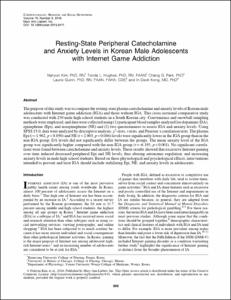Resting-State Peripheral Catecholamine and Anxiety Levels in Korean Male Adolescents with Internet Game Addiction
- Keimyung Author(s)
- Kim, Na Hyun
- Department
- Dept. of Nursing (간호학)
- Journal Title
- Cyberpsychology, Behavior, and Social Networking
- Issued Date
- 2016
- Volume
- 19
- Issue
- 3
- Abstract
- The purpose of this study was to compare the resting-state plasma catecholamine and anxiety levels of Korean male
adolescents with Internet game addiction (IGA) and those without IGA. This cross-sectional comparative study
was conducted with 230 male high school students in a South Korean city. Convenience and snowball sampling
methods were employed, and data were collected using (1) participant blood samples analyzed for dopamine (DA),
epinephrine (Epi), and norepinephrine (NE) and (2) two questionnaires to assess IGA and anxiety levels. Using
SPSS 15.0, data were analyzed by descriptive analysis, v2-tests, t-tests, and Pearson’s correlation tests. The plasma
Epi (t = 1.962, p < 0.050) and NE (t = 2.003, p = 0.046) levels were significantly lower in the IGA group than in the
non-IGA group; DA levels did not significantly differ between the groups. The mean anxiety level of the IGA
group was significantly higher compared with the non-IGA group (t =-6.193, p < 0.001). No significant correlations
were found between catecholamine and anxiety levels. These results showed that excessive Internet gaming
over time induced decreased peripheral Epi and NE levels, thus altering autonomic regulation, and increasing
anxiety levels in male high school students. Based on these physiological and psychological effects, interventions
intended to prevent and treat IGA should include stabilizing Epi, NE, and anxiety levels in adolescents.
- Keimyung Author(s)(Kor)
- 김나현
- Publisher
- College of Nursing
- Citation
- Nahyun Kim et al. (2016). Resting-State Peripheral Catecholamine and Anxiety Levels in Korean Male Adolescents with Internet Game Addiction. Cyberpsychology, Behavior, and Social Networking, 19(3), 202–209. doi: 10.1089/cyber.2015.0411
- Type
- Article
- ISSN
- 2152-2715
- Appears in Collections:
- 2. College of Nursing (간호대학) > Dept. of Nursing (간호학)
- 파일 목록
-
-
Download
 oak-2016-0214.pdf
기타 데이터 / 171.65 kB / Adobe PDF
oak-2016-0214.pdf
기타 데이터 / 171.65 kB / Adobe PDF
-
Items in Repository are protected by copyright, with all rights reserved, unless otherwise indicated.